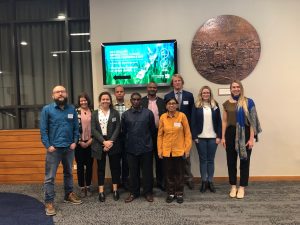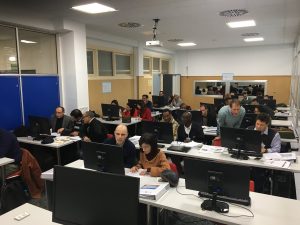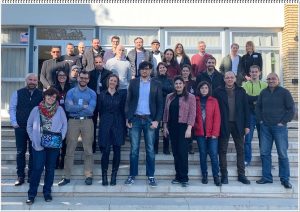In October and November 2018, the Paddy Rice Research Group (PRRG) of the Global Research Alliance (GRA) took part in the APEC-funded project: ‘ Capacity Building on Management Technologies for Climate Smart Rice Cultivation in the South-East Asian and Latin American Rice Sector’.
Paddy rice production is a significant source of methane emissions (CH4), and it is therefore essential that countries find ways to reduce emissions from rice cultivation while improving productivity.
The ‘Capacity Building on Management Technologies for Climate Smart Rice Cultivation in the South-East Asian and Latin American Rice Sector’ project was initiated in 2018 by the Ministry of Agriculture, Forestry, and Fisheries (MAFF), Japan, with the aim of enhancing knowledge among researchers and rice producers of climate change mitigation within the rice sector.
The project was funded by the APEC Agricultural Technical Cooperation Working Group and featured two capability building workshop attended by GRA scientists in partnership with researchers, experts, and rice producers.
The three key aims of the project were:
1) The sharing of knowledge and best practices of new management technologies for adapting to and mitigating climate change in the rice sector;
2) The exchange of views on management technologies and;
3) The development of networks among rice producers, researchers and experts, by organising an international workshop and expert visits.
Two capability building workshops were held; one in Bangkok, Thailand, and one in Parral, Chile. These workshops represented the different production systems found in these two regions and were supported by the Asia and America regional sub-Groups of the Paddy Rice Research Group respectively.
These workshops included expert presentations on a wide range of topics from mitigation through water saving techniques (Alternate Wetting and Drying-AWD) to country-specific experiences, capacity-building training on rice management technologies, and field training.
Following the workshops, farmers expressed an enhanced understanding of the effects of rice cultivation on climate change and the environment, and agreed to share their learning with others in their communities. Farmers and experts agreed on the need for the farming community, governments, and scientists to work together to ensure the right policies are put in place and research projects prioritised to improve climate change mitigation efforts.
Read more:
Read more about the individual presentations, knowledge sharing sessions and field training in APEC’s report: Capacity Building on Management Technologies for Climate Smart Rice Cultivation in the South-East Asian and Latin American Rice Sector.
Sunday, August 04, 2019, Foz do Iguacu, Brazil
The Global Research Alliance, Integrated Research Group (IRG), brings together global networks of research scientists with common interests in modelling of greenhouse gas (GHG) emissions, mitigation solutions, soil carbon sequestration and to inform GHG inventories.
One of the core objectives of the IRG is capacity building, particularly in encouraging younger scientists, to enhance their skills in farm systems analysis and modelling as an essential component of GHG mitigation research.
The purpose of this workshop is therefore to bring together research scientists with experience in farm systems modelling of GHG mitigation, to share their experiences and encourage those with an emerging interest in this area of work.
The outcome would be an expanded global network GHG modellers, committed to collaborating with the next generation of emerging farm systems modellers around the world in farm systems analysis of GHG mitigation.
Structure of the workshop
The workshop invites short (10 minutes) presentations from delegates working in farm systems analysis and modelling of GHG mitigation. These can be either real case study farms or regionally representative farming systems or components
We encourage the presenters to structure their presentations to cover:
- Why the study was conducted;
- How the study was conducted (models used, methods, economics of mitigation) and
- What would you do differently if you repeated the study?
Each talk will be followed by another 10 minutes of facilitated discussion to ensure that attendees get the maximum value from each talk. The day will be divided into themes, depending on the talks being offered e.g. component modelling of soil carbon, enteric methane, nitrous oxide and farm systems analysis. At the end of each theme, there will again be time for general discussion.
The day will end with a summary session of the key mitigation options modelled and models/tools that have been and can be applied, plus discussion on how delegates can collaborate in future.
We therefore invite all those interested in presenting their farm systems modelling research, to contact the organisers, providing a title of their talk and a maximum 100-word abstract of the study they would like to present
Contact:
Prof. Richard Eckard,
Global Research Alliance, Integrative Research Group
The University of Melbourne
Six greenhouse gas inventory specialists and researchers from developing countries visit New Zealand to learn about the compilation of the New Zealand national agricultural greenhouse gas inventory.
As part of its contribution to the Global Research Alliance on Agricultural Greenhouse Gases (GRA), New Zealand hosted six agricultural greenhouse gas inventory specialists, researchers, and government officials from Malawi, Uganda, Uruguay, Mexico, Colombia, and Indonesia from 8 to 12 April 2019.
During the training week, the group learnt about the New Zealand experience in developing the inventory methodology and prioritising research for inventory improvements, particularly for greenhouse gas emissions from livestock.
They attended the New Zealand Agricultural Climate Change Conference (NZACCC) in Palmerston North, hosted by the New Zealand Agricultural Greenhouse Gas Research Centre (NZAGRC). The conference was attended by more than 270 scientists, farmers, industry representatives, and policy makers coming together to discuss climate change mitigation and adaptation in the New Zealand context, and included 20 presentations from New Zealand-based experts in their fields, as well as panel discussions and questions from the floor. The conference also included a presentation by the GRA Special Representative, Hayden Montgomery, on ten years of international leadership through GRA research projects and collaboration.
Following the conference, the group participated in the 2019 Agriculture Greenhouse Gas Inventory Research Workshop, organised by the Ministry for Primary Industries. The workshop was attended by over 50 New Zealand scientists in addition to the international guests, with 13 countries represented in total. The workshop included updates on research projects relating to the New Zealand Agriculture Inventory, and four research priority discussion sessions on soil carbon, nitrous oxide emissions, methane and manure management emissions, and finally on data and modelling. The international guests presented their national perspectives on the strengths of their national inventories, as well as issues they are currently facing in improving their inventory methodologies.
Finally, the group met with officials from the New Zealand Ministry for the Environment, the New Zealand agency in charge of compiling the New Zealand inventory, and from the Ministry of Foreign Affairs and Trade. They learnt about New Zealand’s inventory arrangements and how statistics are collected for the agricultural inventory, and how they might tackle improvements in their inventories through drawing on experience from New Zealand’s senior agriculture inventory expert from the Ministry for Primary Industries.
The Global Research Alliance on Agricultural Greenhouse Gases together with the International Center for Advanced Mediterranean Agronomic Studies (CIHEAM), the Food and Agriculture Organization of the United Nations (FAO), the International Center for Agricultural Research in Dry Areas (ICARDA), the Red Remedia, and the 4 per 1000 Initiative organised an advanced course for professionals on livestock and climate change: “Livestock and climate change: Assessment of emissions, mitigation options and adaptation strategies.”
The course took place from 11 to 15 February 2019 in Zaragoza, Spain, and was hosted by CIHEAM Zaragoza. It provided participants with over 20 hours of in-class training and 14 hours of practical work and debate supplemented by real-life case studies in the context of Mediterranean agriculture and climate change conditions. Participants were given the opportunity to engage in practical exercises on greenhouse gas national inventories calculations while learning more about adaptation and mitigation strategies, measuring methodologies and modelling tools in livestock systems. They also networked with experts and professionals from other countries interested in livestock farming and the mitigation of the effects on the climate and the environment.
For more information about the CIHEAM Zaragoza institute click here to visit their website and here for their twitter.
The Asia sub-group meeting of the Global Research Alliance (GRA) Paddy Rice Research Group (PRRG) will take place in Bangkok, Thailand on the 10-12th of October 2018.
This meeting will take place following the workshop “Rice Landscapes and Climate Change: Options for mitigation in rice-based agroecosystems and the scaling up of climate smart rice cultivation technologies in Asia”. This workshop is an activity of the Paddy Rice Research Group (PRRG) which aims to identify viable options for mitigation and adaptation in rice landscapes and develop scale-up strategies in support of national (NDC) targets.
Organisers of this workshop include the Global Research Alliance of Agricultural Greenhouse Gases (GRA), the Ministry of Agriculture, Forestry and Fisheries of Japan (MAFF) and Asia-Pacific Economic Cooperation (APEC).
Click here for more information about the workshop.
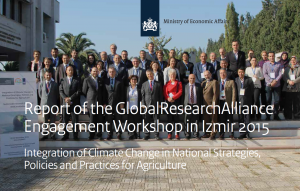 The workshop report for the regional GRA Engagement workshop held 18-19 November 2015 in Izmir, Turkey is now available to download. Participants gave enthusiastic reviews of the workshop, which familiarized non-member countries with the work and achievements of the GRA, created discussion opportunities on the key issues facing eastern Mediterranean and Central Asian countries with respect to agriculture and climate change, and explored further cooperation and GRA membership opportunities. The Turkish Ministry of Food, Agriculture and Livestock, the Dutch Ministry of Economic Affairs and the Embassy of the Kingdom of the Netherlands in Turkey, and the Global Research Alliance on Agricultural Greenhouse Gases were involved. Download the workshop report
The workshop report for the regional GRA Engagement workshop held 18-19 November 2015 in Izmir, Turkey is now available to download. Participants gave enthusiastic reviews of the workshop, which familiarized non-member countries with the work and achievements of the GRA, created discussion opportunities on the key issues facing eastern Mediterranean and Central Asian countries with respect to agriculture and climate change, and explored further cooperation and GRA membership opportunities. The Turkish Ministry of Food, Agriculture and Livestock, the Dutch Ministry of Economic Affairs and the Embassy of the Kingdom of the Netherlands in Turkey, and the Global Research Alliance on Agricultural Greenhouse Gases were involved. Download the workshop report
The GRA’s Soil Carbon and Nitrogen Cycling Cross-Cutting Group (SCNC) organised the second ‘model inter-comparison on agricultural GHG emissions’ workshop in Fort Collins, USA March 2-4 this year.
Co-hosted by the Ministry of Agriculture and Cooperatives (MoAC) of Thailand in Bangkok, the GRA organized a regional meeting to start a network on farming systems. Participating countries were Indonesia, Korea, Malaysia, Myanmar, Philippines, Vietnam and of course Thailand. With the support of Agriterra, farmer representatives from the Philippines and Indonesia also joined this meeting. The Netherlands, the current Chair of the GRA, was represented by the Co-chair of the GRA Inventory and Monitoring (I&M) Group and a policy official of the Dutch Ministry of Economic Affairs. In this two-day workshop, the countries’ policy and research representatives explored the challenges and difficulties of developing farming systems that meet the impact of a changing climate. On the first day the exchange of experiences between participants was the focus. On the second day, participants analyzed the exchanged information and identified common areas of interest. As a result they identified and agreed to put their efforts into four projects. The projects are: 1) Mixed farming systems, 2) Knowledge transfer/adoption of mitigation technologies/adaptations for GHG reduction, 3) Development of information systems for tools and technologies, and 4) Increased collaboration between policy makers, researchers and farmers. For each project, one (or two) leading countries will initiate the process. This very successful workshop makes an impressive start to the regional collaboration initiated and supported by the GRA. In the upcoming months the groups will exchange the results, and as the process continues it will be worthwhile to meet again in a year’s time.
Akarapon Houbcharaun, Thailand: [email protected] / Jan Verhagen, the Netherlands: [email protected]
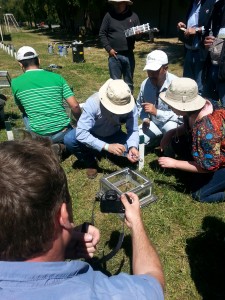 The GRA kick-started 2015 with representatives from ten countries meeting to learn more about the quantification of greenhouse emissions in grazing systems. The meeting, hosted by Chile, involved twelve days of hands-on workshops, alongside lectures and case studies, in the city of Osorno. Workshops included topics such as static chambers construction and sampling, gas chromatography analysis, canister sampling and work with animals.
The GRA kick-started 2015 with representatives from ten countries meeting to learn more about the quantification of greenhouse emissions in grazing systems. The meeting, hosted by Chile, involved twelve days of hands-on workshops, alongside lectures and case studies, in the city of Osorno. Workshops included topics such as static chambers construction and sampling, gas chromatography analysis, canister sampling and work with animals.
The event is a second project that follows the successful four-year partnership project funded by New Zealand and the Inter-American Development Bank (IDB) Regional Fund for Agricultural Technology (FONTAGRO). This partnership project was designed to assist Latin American countries in improving their national greenhouse gas inventories and developing mitigation options adapted to their farming conditions. The 2015 project has expanded to include other countries, and continues to be funded by New Zealand and FONTAGRO.
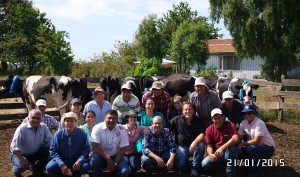 The 2015 participating countries were Bolivia, Colombia, Costa Rica, Ecuador, Honduras, Mexico, Nicaragua, Panama, Paraguay and Peru. Host Chile was one of the five countries (Argentina, Chile, Colombia, Dominican Republic, Uruguay) involved in the first project.
The 2015 participating countries were Bolivia, Colombia, Costa Rica, Ecuador, Honduras, Mexico, Nicaragua, Panama, Paraguay and Peru. Host Chile was one of the five countries (Argentina, Chile, Colombia, Dominican Republic, Uruguay) involved in the first project.
In September the Livestock Research Group of the GRA held a two week training course to increase research capacity in methane and nitrous oxide measurements across Africa. The workshop was held at the University of Pretoria, South Africa.

